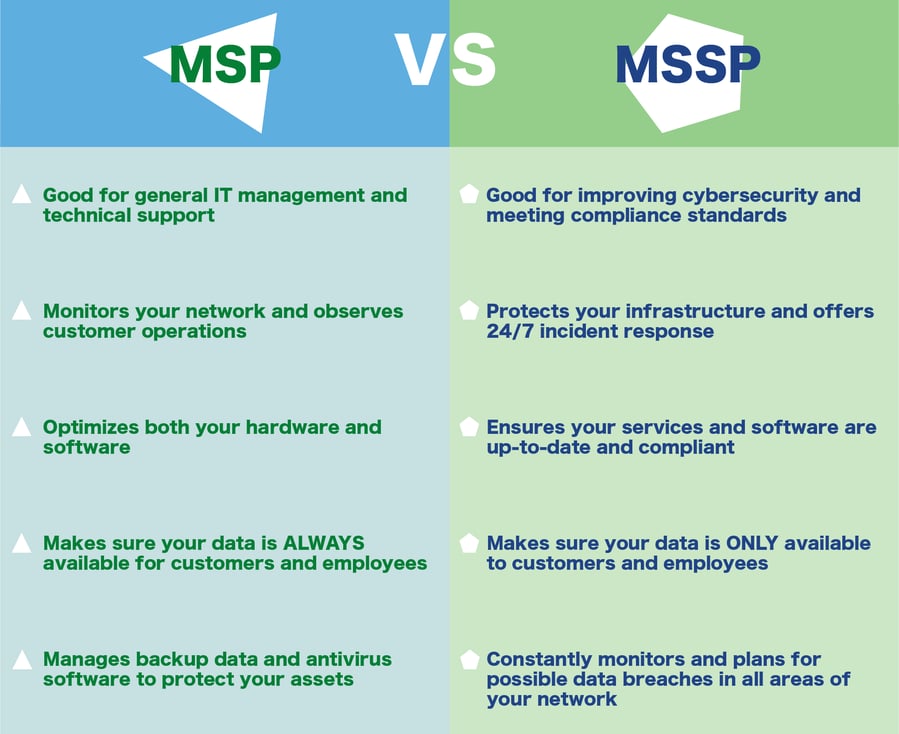MAXIMIZING CYBER INSURANCE: 5 BENEFITS OF PARTNERING WITH AN MSSP
Cyber insurance has emerged as a crucial component of risk management, offering financial protection against the potentially devastating consequences...
4 min read
 Mike Brattain
:
Apr 29, 2021 2:00:00 PM
Mike Brattain
:
Apr 29, 2021 2:00:00 PM

Companies in all industries rely heavily on technology to help with their day-to-day operations. From office workflow management tools to accounting software, employee communication tools, and countless other examples, technology is indispensable to modern businesses.
However, for a business that isn’t specifically built around information technology (IT), managing that tech can be extremely difficult. Building an IT team can be like having to set up a secondary business within the company—one that is expensive and time-consuming to maintain.
There are many considerations to make when managing IT, such as which solutions to use, keeping in line with government and industry regulations, and maintaining everything so that IT resources are available consistently. This is where MSPs and MSSPs can help.
What does MSP stand for? How can MSPs and MSSPs help your business? What’s the difference between MSP and MSSP?
MSP is an acronym for “Managed Service Provider.” An MSP is a company that provides general IT services (usually to small-to-midsized businesses) that helps them make more effective use of their IT resources.
MSPs can provide a wide variety of consultative and IT management services that vary from one provider to the next. For example, some MSPs offer software development services, help with choosing software platforms, migrating data to cloud environments, etc.
For many of their customers, an MSP acts as an external IT team—performing many of the same activities and having the same responsibilities as an internal IT team would have. Common goals of MSPs include things like:
MSSP is an acronym for “Managed Security Service Provider.” Like an MSP, an MSSP is a provider of managed IT services—though with a slightly different focus.
Instead of focusing on general IT services, MSSPs are more concerned with helping their customers meet security and compliance goals. Key MSSP services include things like:

RELATED: What Are the Benefits of Using an MSSP?
Both MSPs and MSSPs can be critical resources for businesses that are struggling to efficiently and effectively manage their IT. However, while both are closely related to IT, there are some IT issues that one type of service will be better equipped for than the other.
Generally speaking, it’s better to hire an MSP if you need general technology services to help make more efficient use of your IT budget, implement a new IT platform, or meet some other goal not related to security or compliance. On the other hand, it’s usually better to hire an MSSP if you’re looking to improve your cybersecurity or need to meet a specific compliance standard.
However, MSPs and MSSPs aren’t always mutually exclusive. Some businesses in the tech industry can provide both kinds of service at the same time—giving you a comprehensive list of IT services under a single, unified strategy that accounts for all your IT needs.
RELATED: What to Look for in a Managed Service Provider?
So, why do companies choose to use managed service providers (and security service providers) rather than handling IT and IT security internally?
There are numerous reasons to use an MSP’s or MSSP’s services, including:
Hiring an internal IT team or cybersecurity team is a long and expensive process. Between putting out advertisements for an open position, time spent interviewing IT engineers, vetting their skills, and onboarding employees, it can take weeks (or months/years) and tens of thousands of dollars to recruit a full IT team.
By hiring an MSP or MSSP with an existing team of qualified IT engineers and cybersecurity experts, companies can skip the recruitment process—saving a ton of time and money on internal recruitment.
According to Indeed, the average base salary for an IT engineer is $79,932 per year. Simply building a team of 3-5 engineers without a Chief Information Officer (CIO) on the team could cost between $239,796 and $399,660 per year.
Add in the cost of recruitment, bonus pay for rarer IT skills, training costs, and benefits, hiring internally becomes an enormous capital outlay for any business. For that cost, a company could hire an MSP or MSSP and get the benefit of a larger team of experts with a broad range of IT skills and experience in tackling all kinds of IT challenges.
One of the biggest challenges in IT is finding people with the right skills. For example, say a company needs to achieve a certain level of CMMC certification or HIPAA compliance. Finding an IT expert who understands the requirements of these compliance standards can be difficult.
Hiring an MSSP can provide the expertise needed to quickly identify issues holding the company back from meeting compliance standards and close gaps quickly.
Alternatively, say a company needs an expert in a specific cloud platform or enterprise application. MSPs may have a team member with the required expertise on staff. By hiring their services, the headhunting process can be skipped while more reliably closing the skills gap.
Another challenge of hiring an internal IT team is that it’s difficult to scale your team to the company’s needs. This can lead to overstaffing, which wastes money, or understaffing, which may result in long delays for critical work—potentially leading to instability in technology resources.
By hiring an MSP or MSSP, companies can increase the scalability of their IT or IT security teams. Instead of having to constantly hire and release IT engineers, they can simply scale up or down their service contract with their IT service provider.
This increased scalability allows companies to ensure that they don’t waste money during “slow” periods of low demand for IT services without running the risk of being short-handed when demand for IT resources spikes.
Do you need an MSP or an MSSP? Why not a company that provides the best of both worlds?
Systems X is a Michigan-based IT services company that provides IT management, advisory, and compliance services. If you have any questions about IT or need advice, please reach out to us!

Cyber insurance has emerged as a crucial component of risk management, offering financial protection against the potentially devastating consequences...

IT administrators manage everything from network infrastructure to cybersecurity, ensuring that your company’s technological framework is robust and...

“What does MSP stand for?” While many business owners are probably familiar with the term by now, for those who may not know, MSP is an acronym for “...